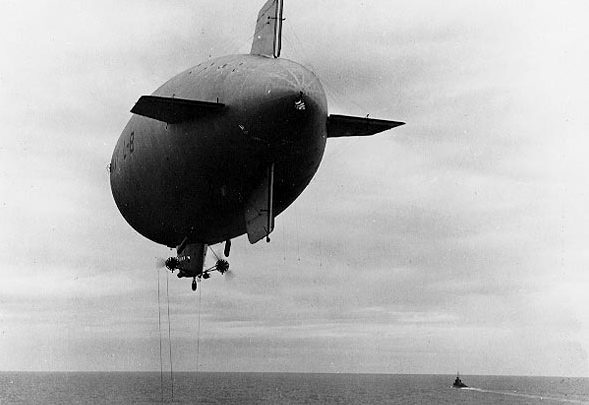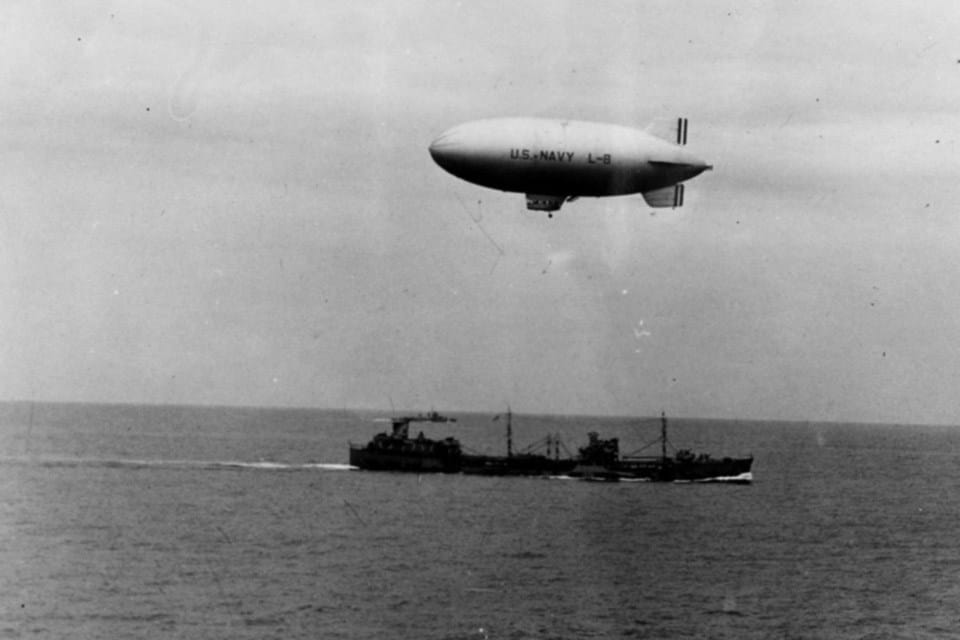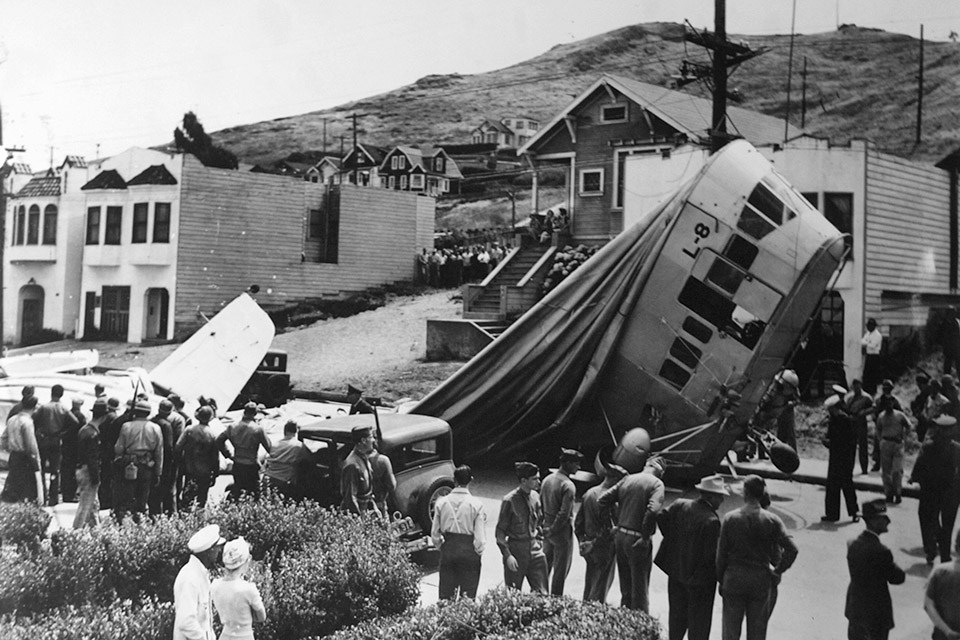Ghost Ship in the Sky: How a WWII sub-hunting blimp crew vanished
- By Sandboxx
Share This Article

This article by Alex Hollings was originally published by SOFREP
Stories of ghost ships adrift in the vast expanses of ocean have survived since man first took to the sea. Legends about ships like The Flying Dutchman, which was lost under the leadership of Van der Decken near the Cape of Good Hope as they traveled toward the East Indies, continue to spring up in reports given by sailors claiming to see the cursed vessel ever continuing on its voyage.
Another famous ship, the Mary Celeste, was found adrift in the Atlantic Ocean in 1872, completely unharmed and in good working order, but missing its crew, a lifeboat, and the captain’s logbook. All of the crew’s possessions remained on board, as well as its untouched payload of 1500 barrels of alcohol, prompting a number of theories ranging from mutiny, to poisoning, to sheer madness.
The two-thirds of our planet covered by water has always been ripe with mysteries, thanks in large part to its ability to swallow ships, airplanes, survivors, and wreckage into its depths, never to be seen again. Without any evidence left behind to help us to understand what happens on ships like the Mary Celeste, the mystery proves enduring, and like a fine wine, mysteries often get better with age. But not every ghost ship is lost at sea. Some ghost ships, in fact, are of the airborne variety.
Nazi U-Boats proved to be a significant threat to allied naval efforts throughout World War II, prompting a number of novel approaches to spotting and combating submarines before they could sneak up on our ships. One such approach was the use of L-Class blimps, which could float above the ocean and spot submerged enemy vessels.
On the morning of August 16th, 1942, Lieutenant Ernest Cody and Ensign Charles Adams climbed aboard their L-8 Airship, a former Goodyear Blimp that had been procured by the Navy in April of that year to deliver equipment to the carrier USS Hornet (CV-8) while at sea. Their mission was simple: head out to sea from their post on Treasure Island in California and look for any signs of enemy submersibles.

A little over an hour into their patrol, the two men radioed that they had spotted an oil slick on the water and were moving to investigate.
“We figured by that time it was a submarine,” said Wesley Frank Lamoureux, a member of the Navy’s Armed Guard Unit who was aboard the cargo ship Albert Gallatin. “From then on, I am not too positive of the actions of the dirigible except that it would come down very close over the water. In fact, it seemed to almost sit on top of the water.”
According to his testimony, the blimp dropped two flares and circled the area, which was in keeping with protocol when investigating the possibility of a German sub. The Albert Gallatin cargo ship, believing the blimp could have located a U-Boat, sounded the general alarm, manned their guns, and made a hasty exit from the area. It would be the last time anyone would see the L-8 operating under the controls of its crew.
A few hours later, the massive air-ship approached the quiet town of Daly City, California. The sagging blimp eventually came to rest after getting snagged in power lines and crashing onto Bellevue Avenue. Crowds quickly amassed in the chaos and a number of people approached the wreckage in hopes of saving the crew… only to find the cabin empty.

The pilot’s parachute remained where it had been stowed before the trip, the life boat was still there as well. The pilot’s cap sat atop the instrument panel, and its payload of two bombs were secured. A briefcase containing confidential documents the crew had orders to dispose of if compromised also remained on board. The only things out-of-place were the blimp itself, and its missing crew.
Like the Mary Celeste, the L-8’s crew had seemed to vanish without a trace, prompting its own slew of theories. Some assumed both the pilot and ensign had simply fallen out of the vessel, though it would have been nearly impossible to do so without both crew members leaving the cabin of the ship while it was still airborne. If there was something damaged that required both men to address on the external hull of the vessel, there was no evidence to suggest what it was in the wreckage.

Another theory postulated that the two men, in the course of investigating the oil slick, lowered their blimp enough to be taken prisoner by the crew of the U-Boat or a Japanese vessel. Still others postulated that the two men were embroiled in a love triangle that drove one to kill the other and then escape by diving into the sea. Despite a thorough investigation, no conclusion could ever be drawn.

So what really did happen to the two-man crew of the L-8? Did they simply fall out of their blimp or did a more nefarious fate befall them? We’ll likely never know – leaving the story of the L-8, the ghost ship in the sky, to be filed under the heading “unsolved” like so many ghost ships before it.
Related Posts
Sandboxx News Merch
-

‘AirPower’ Classic Hoodie
$46.00 – $48.00 Select options This product has multiple variants. The options may be chosen on the product page -

‘Sandboxx News’ Trucker Cap
$27.00 Select options This product has multiple variants. The options may be chosen on the product page -

‘Kinetic Diplomacy’ Bumper Sticker (White)
$8.00 Add to cart

Sandboxx
The editorial team at Sandboxx.
Related to: Military History

Space Force to deploy new jammers to yell at enemy satellites

Congress demands answers on low testosterone issues among special operators

Video: US military sends aircraft to help with LA fires

Video: DARPA wants to arms a missile with cannons
Sandboxx News
-

‘Sandboxx News’ Trucker Cap
$27.00 Select options This product has multiple variants. The options may be chosen on the product page -

‘AirPower’ Classic Hoodie
$46.00 – $48.00 Select options This product has multiple variants. The options may be chosen on the product page -

‘AirPower’ Golf Rope Hat
$31.00 Select options This product has multiple variants. The options may be chosen on the product page -

‘Sandboxx News’ Dad Hat
$27.00 Select options This product has multiple variants. The options may be chosen on the product page
